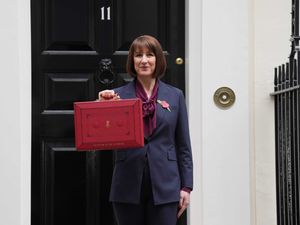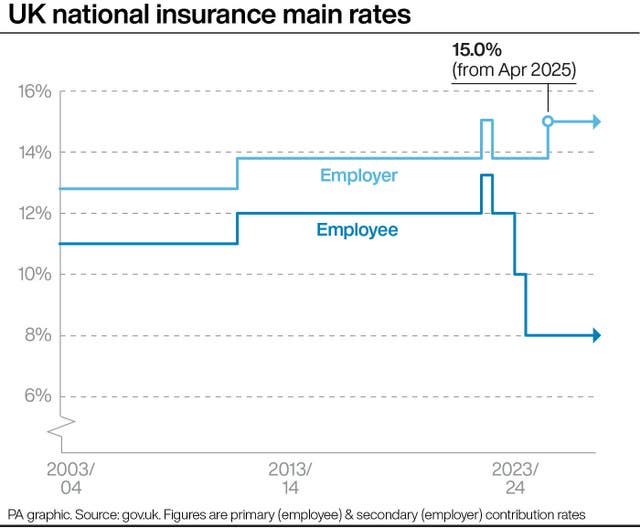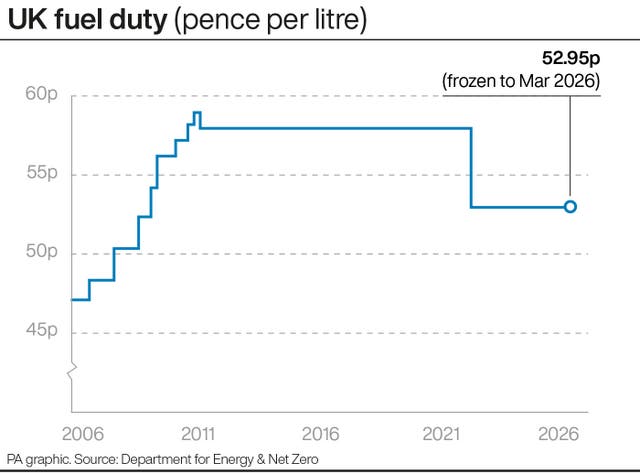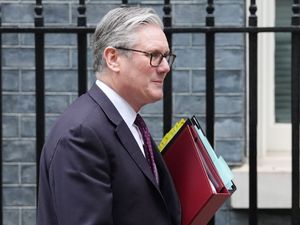Taxes, borrowing and spending up in Rachel Reeves’ first Budget
Chancellor Rachel Reeves said she was ‘fixing the foundations of our economy’ but taxes will rise to their highest levels since the Second World War.

Rachel Reeves announced £40 billion a year in extra taxes as she increased Government borrowing and spending to “rebuild Britain”.
The Chancellor’s plans will see the tax burden reach an historic high, while borrowing increases by an average £32.3 billion a year as spending increases by around £70 billion annually over the next five years.
Ms Reeves said the measures were necessary to address the “black hole” in the public finances left by the Tories while pumping billions into schools and hospitals.
She confirmed plans to hike employers’ national insurance contributions and increase capital gains tax, while also making changes to inheritance tax and stamp duty.
And changing the way government debt is measured allowed her greater flexibility to borrow, resulting in what the Office for Budget Responsibility (OBR) called “one of the largest fiscal loosenings of any fiscal event in recent decades”.
The tax burden will reach 38.3% of gross domestic product (GDP) in 2027-28, the highest since 1948 as the UK recovered from the impact of the Second World War.
In the first Budget ever delivered by a female chancellor, and the first Labour financial statement since 2010, Ms Reeves said: “This is a moment of fundamental choice for Britain.
“I have made my choices. The responsible choices. To restore stability to our country. To protect working people.
“More teachers in our schools. More appointments in our NHS. More homes being built.
“Fixing the foundations of our economy. Investing in our future. Delivering change. Rebuilding Britain.”
But Tory leader Rishi Sunak accused Ms Reeves of “fiddling the figures” by changing the way debt is measured adding: “The reason the Chancellor has increased borrowing and increased taxes is because she has totally failed to grip public spending.”
The Office for Budget Responsibility’s forecast suggested the increase in spending would provide a temporary boost to GDP, upgrading growth this year from 0.8% to 1.1% and from 1.9% to 2.0% in 2025.
But there are downgrades in subsequent years – down from an expected 2% in 2026 to 1.8%, from 1.8% in 2027 to 1.5% and from 1.7% in 2028 to 1.5%.
And the Budget measures will also add to pressure on inflation, the OBR said.
The latest OBR forecasts indicate that inflation will rise to 2.6% in 2025 “partly due to the direct and indirect impact of the Budget” – significantly above the 1.5% rate previously predicted.
It also increased projections for the following three years, with inflation expected to hit 2.3% for 2026, 2.1% for 2027 and 2.1% for 2028
Ms Reeves claimed the scale of the public spending problems she inherited were worse than previously thought.
She repeated her claim that a £22 billion “black hole” left by the Tories in this year’s finances showed they “hid the reality of their public spending plans”, with problems recurring in future years.
The OBR steered clear of using the £22 billion figure in its assessment of the previous government’s figures.
Ms Reeves also promised to set aside £11.8 billion to compensate those affected by the infected blood scandal and £1.8 billion to compensate victims of the Post Office Horizon scandal.
The Chancellor said: “Together, the black hole in our public finances this year, which recurs every year, the compensation payments which they did not fund and their failure to assess the scale of the challenges facing our public services means this Budget raises taxes by £40 billion.
“Any Chancellor standing here today would face this reality. And any responsible Chancellor would take action.
“That is why today, I am restoring stability to our public finances and rebuilding our public services.”
She confirmed a raid on employers’ national insurance contributions (NICs), with higher rates and a lower starting threshold, raising £25.7 billion by 2029-30.

The rate will increase by 1.2 percentage points to 15% from April 2025, with payments starting when an employee earns £5,000, down from the current £9,100.
“I know that this is a difficult choice. I do not take this decision lightly,” Ms Reeves said.
Despite Labour’s manifesto commitment not to hit working people with taxes, the OBR estimated that firms will pass on the impact of NICs through lower wages.
By 2026-27 the OBR forecasts that 76% of the total cost is passed on through lower real wages – a combination of pay cuts and increased prices.
The measure could also lead to the equivalent of around 50,000 average-hour jobs being lost, the watchdog said.
The Institute for Fiscal Studies’ director Paul Johnson said: “The OBR suggests that three-quarters of the impact of employer NICs will be felt by employees, even if the changes don’t show up on payslips.
“Indeed, these tax rises partly explain why the OBR has downgraded its projections for real household income growth over the next few years.
“Somebody will pay for the higher taxes – largely working people.”
The Chancellor announced a £2.5 billion increase in capital gains tax by increasing the lower rate from 10% to 18% and the higher rate from 20% to 24%.
She also confirmed changes to inheritance tax, including bringing pension pots within the tax from April 2027, and reforms to agricultural and business property reliefs, raising a total of £2 billion a year.
Labour’s commitment to impose VAT on private schools will raise £1.7 billion by 2029-30, while changes to the energy profits levy and air passenger duty rates rake in £3.6 billion.
The stamp duty land tax surcharge for second homes will increase by two percentage points to 5% from Thursday.
The tax hikes and increased borrowing allow Ms Reeves to provide a £22.6 billion increase in the day-to-day health budget as well as a £3.1 billion increase in the capital budget, which she called the “largest real-terms growth in day-to-day NHS spending outside of Covid since 2010”.
She also promised £1.4 billion to rebuild more than 500 schools as part of a 19% real-terms increase in the Department for Education’s capital budget, along with £2.1 billion for school maintenance.
Ms Reeves, who stressed she was committed to helping “working people”, promised to end the freeze on income tax and national insurance thresholds from 2028-29, reducing the impact of “fiscal drag” where rising wages see people pulled into higher tax bands.

In other measures:
– The freeze on fuel duty will continue, including maintaining the existing 5p cut.
– A flat rate of duty will be applied on all vaping liquid from October 2026 alongside an additional one-off increase in tobacco duty to encourage people to give up smoking.
– The soft drinks industry levy will be increased to account for inflation.
– While alcohol duty rates on non-draught products will increase in line with RPI inflation, draught duty will be cut by 1.7%, knocking a penny off a pint in the pub.
– The Government will commit the funding required to extend the HS2 high-speed rail line to Euston in central London.
– There will be “over £5 billion of Government investment” in housebuilding, with £1 billion to strip dangerous cladding from buildings.
– The weekly earnings limit for carers allowance will rise to the equivalent of 16 hours a week at the national living wage, the largest increase since the allowance was introduced.
– The Chancellor promised to save £4.3 billion a year from the cost of welfare by tackling fraud and recovering debt.
Ms Reeves’s Budget was constrained by two self-imposed “fiscal rules” – funding day-to-day spending through taxation and for debt, measured by the new benchmark of “public sector net financial liabilities” (PSNFL), to be falling as a share of GDP.
On the central forecast they are on course to be met by margins of £9.9 billion and £15.7 billion in five years’ time.





